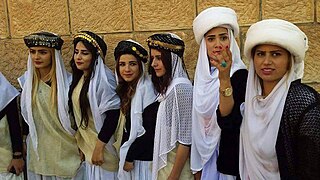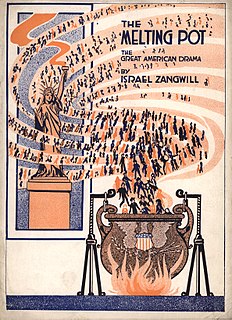Related Research Articles
Xenophobia is the fear or hatred of that which is perceived to be foreign or strange. It is an expression of perceived conflict between an ingroup and an outgroup and may manifest in suspicion by the one of the other's activities, a desire to eliminate their presence, and fear of losing national, ethnic, or racial identity.

The term multiculturalism has a range of meanings within the contexts of sociology, political philosophy, and colloquial use. In sociology and in everyday usage, it is a synonym for "ethnic pluralism", with the two terms often used interchangeably, and for cultural pluralism in which various ethnic groups collaborate and enter into a dialogue with one another without having to sacrifice their particular identities. It can describe a mixed ethnic community area where multiple cultural traditions exist or a single country within which they do. Groups associated with an indigenous, aboriginal or autochthonous ethnic group and settler-descended ethnic groups are often the focus.

An ethnic conflict is a conflict between two or more contending ethnic groups. While the source of the conflict may be political, social, economic or religious, the individuals in conflict must expressly fight for their ethnic group's position within society. This criterion differentiates ethnic conflict from other forms of struggle.

An ethnic group or an ethnicity is a grouping of people who identify with each other on the basis of shared attributes that distinguish them from other groups. Those attributes can include common sets of traditions, ancestry, language, history, society, culture, nation, religion, or social treatment within their residing area. Ethnicity is sometimes used interchangeably with the term nation, particularly in cases of ethnic nationalism, and is separate from the related concept of races.

The melting pot is a monocultural metaphor for a heterogeneous society becoming more homogeneous, the different elements "melting together" with a common culture; an alternative being a homogeneous society becoming more heterogeneous through the influx of foreign elements with different cultural backgrounds, possessing the potential to create disharmony within the previous culture. It can also create a harmonious hybridized society known as cultural amalgamation. Historically, it is often used to describe the cultural integration of immigrants to the United States. A related concept has been defined as "cultural additivity."
Separatism is the advocacy of cultural, ethnic, tribal, religious, racial, governmental or gender separation from the larger group. As with secession, separatism conventionally refers to full political separation. Groups simply seeking greater autonomy are not separatist as such. Some discourse settings equate separatism with religious segregation, racial segregation, or sex segregation, while other discourse settings take the broader view that separation by choice may serve useful purposes and is not the same as government-enforced segregation. There is some academic debate about this definition, and in particular how it relates to secessionism, as has been discussed online.
The Punjabis or the Punjabi people, are an Indo-Aryan ethnolinguistic group, associated with the Punjab region of the Indian subcontinent presently divided between Pakistan and India. They speak Punjabi, a language from the Indo-Aryan language family. Punjabis are the largest ethnic group in Pakistan.
A multinational state or a multinational union is a sovereign entity that comprises two or more nations or states. This contrasts with a nation state, where a single nation accounts for the bulk of the population. Depending on the definition of "nation", a multinational state is usually multicultural or multilingual, and is geographically composed of more than one country, eg Countries of the United Kingdom.
Altaf Hussain is a British Pakistani politician who is known as the founder of the Muttahida Qaumi Movement. He holds United Kingdom citizenship and has been living in exile in Great Britain since the start of Operation Clean-up. Since 2015, he has been a fugitive from the Anti Terrorism Court of Pakistan on the charges of murder, targeted killings, treason, inciting violence and hate speeches he is due to go on trial in the United Kingdom in January 2022 for promoting terrorism and unrest through hate speech in Pakistan. He fled the country in 1992 after crackdown against his party was launched and since then he is living in the United Kingdom.
Pan-nationalism is a specific term, used mainly in social sciences as a designation for those forms of nationalism that are trying to transcend (overcome) traditional boundaries of basic national identities, in order to create a "higher" pan-national (all-inclusive) identity, based on various common denominators. Pan-nationalism can occur as a specific variant of all common forms of nationalism. In relation to classical state nationalism, pan-nationalism manifests itself through various political movements that are advocating the creation of "higher" (pan-national) forms of political identity, based on a regional or continental grouping of national states. In terms of ethnic nationalism, pan-nationalism can also manifest itself through specific ethnic movements that are advocating the creation of "higher" (pan-national) forms of common identity that is based on ethnic grouping. Other forms of nationalism also have their pan-national variants.

Social cycle theories are among the earliest social theories in sociology. Unlike the theory of social evolutionism, which views the evolution of society and human history as progressing in some new, unique direction(s), sociological cycle theory argues that events and stages of society and history generally repeat themselves in cycles. Such a theory does not necessarily imply that there cannot be any social progress. In the early theory of Sima Qian and the more recent theories of long-term ("secular") political-demographic cycles as well as in the Varnic theory of P.R. Sarkar an explicit accounting is made of social progress.

The two-nation theory is an ideology of religious nationalism which significantly influenced the Indian subcontinent following its independence from the British Empire. According to this theory, Indian Muslims and Indian Hindus are two separate nations, with their own customs, religion, and traditions; therefore, from social and moral points of view, Muslims should be able to have their own separate homeland outside of Hindu-majority India, one in which Islam is the dominant religion, and be segregated from Hindus and other non-Muslims. The two-nation theory advocated by the All India Muslim League is the founding principle of the Pakistan Movement through the partition of India in 1947.

'Asabiyyah or 'asabiyya is a concept of social solidarity with an emphasis on unity, group consciousness, and a sense of shared purpose and social cohesion, originally used in the context of tribalism and clanism.
Peter Valentinovich Turchin is a Russian-American complexity scientist, specializing in an area of study he and his colleagues developed called cliodynamics—mathematical modeling and statistical analysis of the dynamics of historical societies. He is currently Editor-in-Chief at Cliodynamics: The Journal of Quantitative History and Cultural Evolution. As of 2020, he is a director of the Evolution Institute.

The Sikh diaspora is the modern Sikh migration from the traditional area of the Punjab region of India. Sikhism is a religion, the Punjab region of India being the historic homeland of Sikhism. The Sikh diaspora is largely a subset of the Punjabi diaspora.
Cliodynamics is a transdisciplinary area of research that integrates cultural evolution, economic history/cliometrics, macrosociology, the mathematical modeling of historical processes during the longue durée, and the construction and analysis of historical databases.
Criticism of multiculturalism questions the ideal of the maintenance of distinct ethnic cultures within a country. Multiculturalism is a particular subject of debate in certain European nations that are associated with the idea of a nation state. Critics of multiculturalism may argue against cultural integration of different ethnic and cultural groups to the existing laws and values of the country. Alternatively critics may argue for assimilation of different ethnic and cultural groups to a single national identity.

Multiculturalism in Australia is today reflected by the multicultural composition of its people, its immigration policies, its prohibition on discrimination, equality before the law of all persons, as well as various cultural policies which promote diversity, such as the formation of the Special Broadcasting Service.
During the Partition of India, violence against women was an extensive situation. It is estimated that during the partition between 75,000 and 100,000 women were kidnapped and raped. The rape of women by males during this period is well documented, with women also being complicit in these attacks. Systematic violence against women started in March 1947 in Rawalpindi district where Sikh women were targeted by Muslim mobs. Violence was also perpetrated on an organized basis, with Pathans taking Hindu and Sikh women from refugee trains while one accused that he witnessed armed Sikhs periodically dragging Muslim women. It has been estimated that specifically in the Punjab, the number of abducted Muslim women was double the number of abducted Hindu and Sikh women, because of the actions of coordinated Sikh jathas who were aided and armed by Sikh rulers of the 16 semi-autonomous princely states in Punjab which overlapped the expected partition border, and had been preparing to oust the Muslims from East Punjab in case of a partition. India and Pakistan later worked to repatriate the abducted women. Muslim women were to be sent to Pakistan and Hindu and Sikh women to India.
Mikhail Konstantinovich Kudryavtsev was a Soviet ethnographer and Indologist.
References
- ↑ Brook, Solomon, and Nikolai Cheboksarov. 1984. "Metaethnic Identities in Asia and Africa." In Ethnocultural Development of African Countries. Moscow: USSR Academy of Sciences. Pp. 49-73.
- ↑ Agadjanian, Alexander. 2001. "Religious pluralism and national identity in Russia." MOST Journal on Multicultural Societies, Vol. 2, No. 2 (note 19)
- ↑ Davis, Mike. 1999. "Magical Urbanism: Latinos Reinvent the US Big City." New Left Review I/234, March-April 1999
- ↑ Turchin, Peter (2003). Historical Dynamics: Why States Rise and Fall. Princeton University Press. ISBN 9780691116693.
- ↑ Hussain, Imtiaz (2004). Tyranny of Soft Touches: Interculturalism, Multiculturalism, and 21st Century International Relations. Universidad Iberoamericana. ISBN 9789688595381.